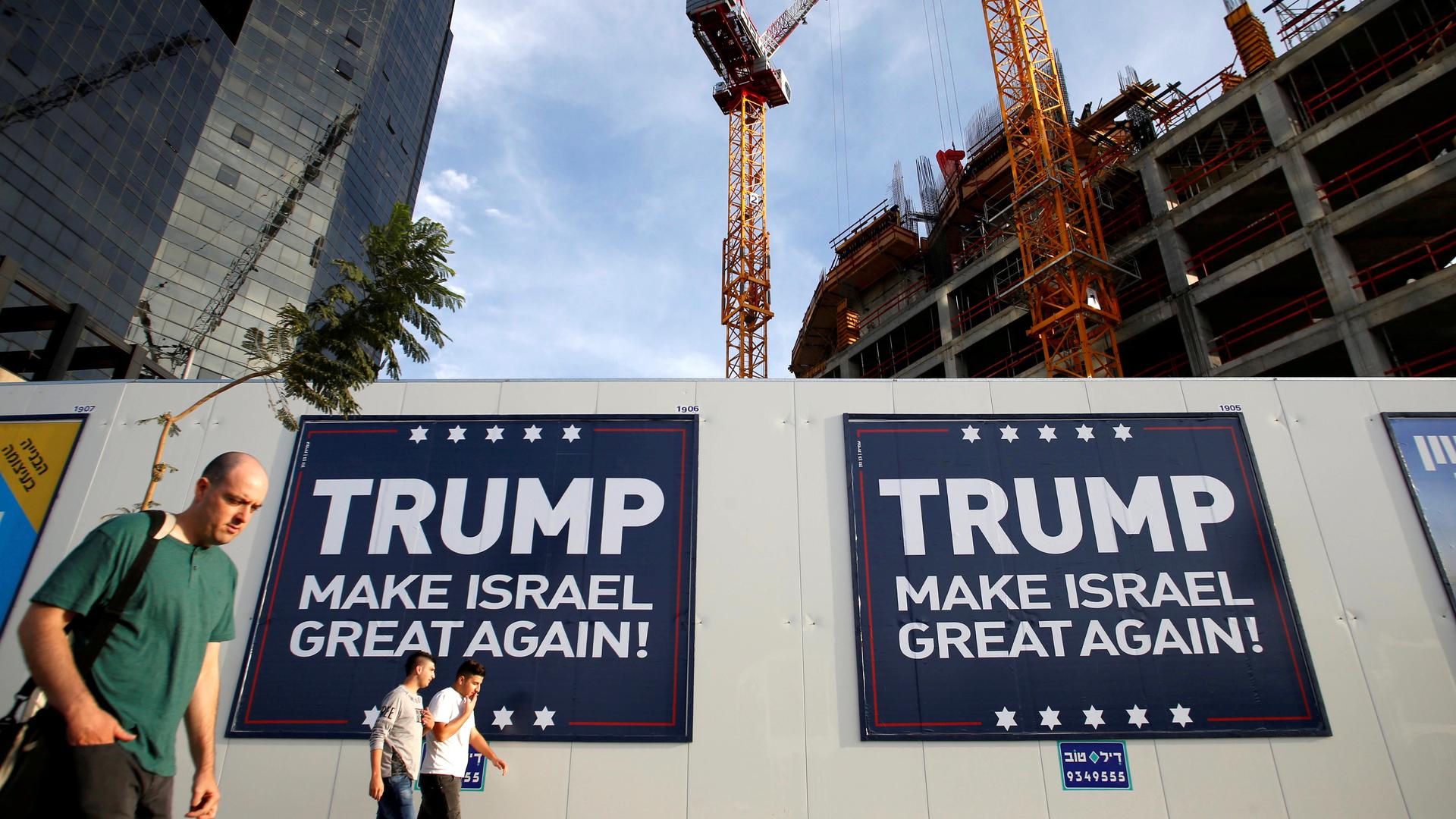Israel develops new ties with Saudi Arabia and other Gulf states
People walk past signs bearing the name of U.S. President-elect Republican Donald Trump in Tel Aviv, Israel on November 14, 2016.
Israel and Saudi Arabia have no diplomatic relations. And yet, recently, Saudi officials have been willing to meet Israeli officials publicly. General Yakov Amidror, a former senior advisor to Prime Minister Benjamin Netanyahu, and former Saudi intelligence chief Prince Turki al-Feisal might have seemed an odd pair when they met publicly at the Washington Institute in Washington, D.C. last year.
According to Amidror, al-Feisal said once Israel reaches an agreement with the Palestinians, “together we can change the Middle East.” He added, “There is nothing that can stop the combination of Israeli money and the Saudi mind.”
Saudi Arabia and other Gulf States share common goals with Israel, one of which is developing new energy, water, and agricultural technology. In 2015, Israel opened its first diplomatic mission in the United Arab Emirates, and there are extensive business ties between Israel and Gulf countries valued at hundreds of millions of dollars.
Israel and the Gulf States also share common enemies: ISIS and Iran. According to Dan Diker, head of the project for counter-political warfare at the Jerusalem Center for Public Affairs, the threat of a nuclear Iran and the Islamic Republic’s terror proxies around the Middle East are particularly worrisome for the Gulf States.
“That convergence of concern between Israel, the Sunni Arab states and President [Donald] Trump’s administration creates the possibility for real coordination and cooperation between Israel and the Arab world.” These geopolitical circumstances, Diker says, “make Israeli outreach and Arab acceptance much more possible than it was before.”
Egypt and Jordan already have longstanding peace treaties with Israel. And Israeli Prime Minister Benjamin Netanyahu has reached out to more of the Arab world as efforts for a deal with the Palestinians have foundered. According to Times of Israel Editor David Horvitz, Netanyahu “has wanted to believe that if Israel can deepen its relations more widely across the region, that may lead to the Palestinians being prodded in a more compromising direction by other Arab parties.”
In other words, Netanyahu hopes his new Arab friends may be able to nudge the Palestinians back to negotiations.
Security ties between Israel and Egypt have grown under Egyptian President Abdel Fattah el-Sisi as Israel has shared intelligence to help fight ISIS in the Sinai desert. But there have been no serious Israeli-Palestinian negotiations for four years. The Egyptian Ambassador to Israel, Hazem Kheirat, told a recent conference in Tel Aviv that there remains no alternative to the two state solution for an independent Palestinian state next to Israel.
He added that while it is up to the Israelis and Palestinians to reach their final agreement through direct negotiations, “we also have to recognize that the role of the international community, especially the United States, in helping the parties reach this agreement and support them in implementing it.”
Palestinian officials say they will make sure they aren't sidelined. Senior official Jibril Rajoub says Arab states know the Palestinians cannot be ignored. He said the best chance for a deal is the Arab Peace Initiative, which calls for a complete Israeli withdrawal from the West Bank, Gaza Strip and East Jerusalem. “In the Arab summit,” he said, “we have to ask the Arabs to reassure everybody that the only game in town is the two-state solution and the Arab Initiative is still alive.”
Rajoub also acknowledged “a new development” — the Trump Administration in Washington.
Netanyahu received a warm welcome when he visited the White House in February. In March, Trump invited Palestinian Authority President Mahmoud Abbas to the White House amid declarations that Trump wants a new Israeli-Palestinian agreement. The two leaders have yet to meet, and without a peace agreement, it does not seem likely the Gulf States will establish official diplomatic relations with Israel, particularly after decades of taking a hard line against the Jewish State. In that sense, Amidror sees the Gulf States as “prisoners of their own propaganda” because they spent years telling their own people “that Israel is an enemy, that it is occupying the Palestinians.
“Today we know for sure, meeting many people from those countries that they don’t care about the Palestinians. They don’t care about the details of the agreement that Israel will reach with the Palestinians. But they need it before they declare the open relations with Israel.”
Yet whether openly or under the table, Israel’s relations with Saudi Arabia and the Gulf States are likely to continue to expand.
We want to hear your feedback so we can keep improving our website, theworld.org. Please fill out this quick survey and let us know your thoughts (your answers will be anonymous). Thanks for your time!
